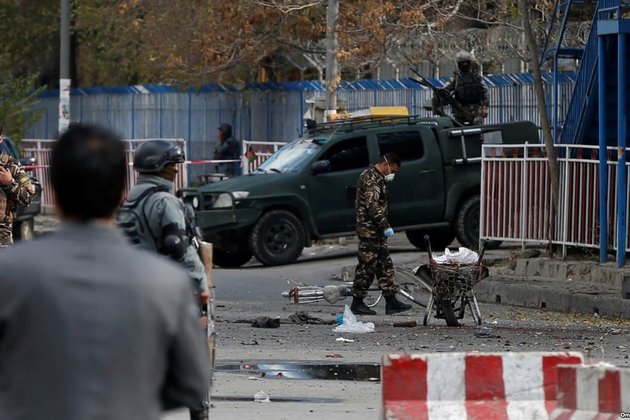www.aljazeerah.info
News, November 2018
Archives
Mission & Name
Conflict Terminology
Editorials
Gaza Holocaust
Gulf War
Isdood
Islam
News
News Photos
Opinion Editorials
US Foreign Policy (Dr. El-Najjar's Articles)
www.aljazeerah.info
|
Editorial Note: The following news reports are summaries from original sources. They may also include corrections of Arabic names and political terminology. Comments are in parentheses. |
Dozens of Afghanis Killed in Deadly Clashes and Suicide Bombing
November 13, 2018
Afghanistan News and RFE
 |
|
| Site of a suicide bombing attack in Kabul, November 12, 2018 |
RFE 13 Nov 2018, 00:07 GMT+10
Dozens of people have been killed in violence across Afghanistan, including in a suicide bombing in Kabul targeting a protest by members of the mainly Shi'ite Hazara minority, officials say.
Security officials said the suicide blast on November 12 killed at least six people and wounded 20 others in the center of the capital, where hundreds of people were protesting the government's failure to protect the Hazara community from Taliban attacks.
The explosion rocked the city as fighting raged in the central province of Ghazni, where Afghan forces and pro-government militias have been battling the Taliban for the past week.
Officials said on November 12 that 25 Afghan security personnel were killed in Ghazni's predominately Hazara districts of Malistan and Jaghori. The Taliban also attacked a third district, Khas Oruzgan, in neighboring Oruzgan Province two weeks ago.
The Taliban offensive in the three predominately Hazara districts has left dozens of government troops, pro-government Hazara militia men, and Taliban militants dead and forced hundreds of civilians to flee their homes.
In the western province of Farah, at least 37 local police were killed when Taliban fighters overran several security checkpoints, regional officials said on November 12.
Afghanistan's main intelligence agency, the National Directorate of Security (NDS), said in a statement that the bomber was on foot and detonated his suicide vest before reaching the protesters.
Interior Ministry spokesman Najib Danesh told RFE/RL that civilians and security personnel deployed to secure the city during the protest were among the dead.
No group claimed responsibility for the attack, although the Taliban and the Islamic State (IS) militant groups have been blamed for similar attacks in the past.
The blast occurred near a security checkpoint near the Istiqlal high school in central Kabul, close to the area where ministry buildings and the Presidential Palace are located.
The Afghan president's office said protesters ended their demonstration after President Ashraf Ghani addressed the crowd and promised to send reinforcements to the besieged districts.
Hazara Demand Protection
Hundreds of people had rallied for a second day in front of the Presidential Palace to protest against the government's inaction in sending reinforcements to the three districts under siege in the provinces of Ghazni and Oruzgan.
Officials said that the Taliban killed 15 civilians and 10 members of the special forces in Ghazni on November 11, after the government said it had sent special forces backed by air strikes to the districts under attack.
There have been fears that the violence could be rooted in ethnic or sectarian differences, pitting the Hazara against the Taliban, a predominately Sunni, ethnic Pashtun group.
The Taliban was accused of committing human rights violations against Hazara during their 1996-2001 rule.
In the western province of Farah, at least 37 members of the Afghan security forces were killed in overnight attacks by Taliban fighters on checkpoints that triggered hours of fighting, local officials said on November 12.
The spike in violence comes as visiting U.S. special envoy Zakmay Khalilzad held talks with Afghan President Ashraf Ghani on November 11 in his latest round of meetings aimed at convincing the Taliban to take part in peace talks with Kabul to end the decades-long war in Afghanistan.
Khalilzad, a former U.S. ambassador to Kabul, is also scheduled to visit Pakistan, the United Arab Emirates, and Qatar, where the Taliban has a political office.
A recent U.S. government watchdog report said Kabul's control of Afghanistan had slipped in recent months as local forces made little or no progress against the Taliban.
The U.S. Special Inspector General for Afghanistan Reconstruction, citing NATO's Resolute Support mission, said this summer's casualty toll for Afghan forces had been worse than ever.
With reporting by AFP, Reuters, and dpa RFE/RL's Radio Free Afghanistan
RFE/RL's Radio Azadi is the leading media outlet in Afghanistan today, reaching more than 60 percent of the Afghan population across the country with its radio and Internet programs.
***
Share the link of this article with your facebook friendsFair Use Notice
This site contains copyrighted material the
use of which has not always been specifically authorized by the copyright
owner. We are making such material available in our efforts to advance
understanding of environmental, political, human rights, economic,
democracy, scientific, and social justice issues, etc. We believe this
constitutes a 'fair use' of any such copyrighted material as provided for
in section 107 of the US Copyright Law. In accordance with Title 17 U.S.C.
Section 107, the material on this site is
distributed without profit to those
who have expressed a prior interest in receiving the included information
for research and educational purposes. For more information go to: http://www.law.cornell.edu/uscode/17/107.shtml.
If you wish to use copyrighted material from this site for purposes of
your own that go beyond 'fair use', you must obtain permission from the
copyright owner.
|
|
|
|
||
|
||||||


